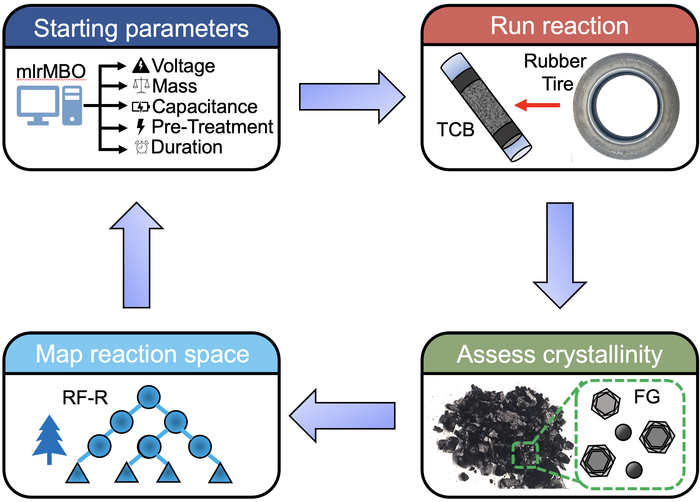HOUSTON – (Jan. 31, 2022) – Rice University scientists are using machine-learning techniques to streamline the process of synthesizing graphene from waste through flash Joule heating.

Credit: Jacob Beckham/Rice University
HOUSTON – (Jan. 31, 2022) – Rice University scientists are using machine-learning techniques to streamline the process of synthesizing graphene from waste through flash Joule heating.
The process discovered two years ago by the Rice lab of chemist James Tour has expanded beyond making graphene from various carbon sources to extracting other materials like metals from urban waste, with the promise of more environmentally friendly recycling to come.
The technique is the same for all of the above: blasting a jolt of high energy through the source material to eliminate all but the desired product. But the details for flashing each feedstock are different.
The researchers describe in Advanced Materials how machine-learning models that adapt to variables and show them how to optimize procedures are helping them push forward.
“Machine-learning algorithms will be critical to making the flash process rapid and scalable without negatively affecting the graphene product’s properties,” Tour said.
“In the coming years, the flash parameters can vary depending on the feedstock, whether it’s petroleum-based, coal, plastic, household waste or anything else,” he said. “Depending on the type of graphene we want — small flake, large flake, high turbostratic, level of purity — the machine can discern by itself what parameters to change.”
Because flashing makes graphene in hundreds of milliseconds, it’s difficult to tease out the details of the chemical process. So Tour and company took a clue from materials scientists who have worked machine learning into their everyday process of discovery.
“It turned out that machine learning and flash Joule heating had really good synergy,” said Rice graduate student and lead author Jacob Beckham. “Flash Joule heating is a really powerful technique, but it’s difficult to control some of the variables involved, like the rate of current discharge during a reaction. And that’s where machine learning can really shine. It’s a great tool for finding relationships between multiple variables, even when it’s impossible to do a complete search of the parameter space.
“That synergy made it possible to synthesize graphene from scrap material based entirely on the models’ understanding of the Joule heating process,” he said. “All we had to do was carry out the reaction — which can eventually be automated.”
The lab used its custom optimization model to improve graphene crystallization from four starting materials — carbon black, plastic pyrolysis ash, pyrolyzed rubber tires and coke — over 173 trials, using Raman spectroscopy to characterize the starting materials and graphene products.
The researchers then fed more than 20,000 spectroscopy results to the model and asked it to predict which starting materials would provide the best yield of graphene. The model also took the effects of charge density, sample mass and material type into account in their calculations.
Co-authors are Rice graduate students Kevin Wyss, Emily McHugh, Paul Advincula and Weiyin Chen; Rice alumnus John Li; and postdoctoral researcher Yunchao Xie and Jian Lin, an associate professor of mechanical and aerospace engineering, of the University of Missouri. Tour is the T.T. and W.F. Chao Chair in Chemistry as well as a professor of computer science and of materials science and nanoengineering.
The Air Force Office of Scientific Research (FA9550-19- 1-0296), U.S. Army Corps of Engineers (W912HZ-21-2-0050) and the Department of Energy (DE- FE0031794) supported the research.
-30-
Read the paper at https://onlinelibrary.wiley.com/doi/10.1002/adma.202106506.
This news release can be found online at https://news.rice.edu/news/2022/machine-learning-fine-tunes-flash-graphene.
Follow Rice News and Media Relations via Twitter @RiceUNews.
Related materials:
Rice lab turns trans into valuable graphene in a flash: https://news.rice.edu/news/2020/rice-lab-turns-trash-valuable-graphene-flash
Tour Group: https://www.jmtour.com
Rice Department of Chemistry: https://chemistry.rice.edu
Wiess School of Natural Sciences: https://naturalsciences.rice.edu
Images for download:
https://news-network.rice.edu/news/files/2022/01/0131_MACHINE-1-WEB.jpg
Machine learning is fine-tuning Rice University’s flash Joule heating method for making graphene from a variety of carbon sources, including waste materials. (Credit: Jacob Beckham/Tour Group)
https://news-network.rice.edu/news/files/2022/01/0131_MACHINE-2-WEB.jpg
Rice University chemists are employing machine learning to fine-tune its flash Joule heating process to make graphene. (Credit: Jeff Fitlow/Rice University)
https://news-network.rice.edu/news/files/2022/01/0131_MACHINE-3-WEB.jpg
CAPTION: Jacob Beckham. (Credit: Rice University)
Located on a 300-acre forested campus in Houston, Rice University is consistently ranked among the nation’s top 20 universities by U.S. News & World Report. Rice has highly respected schools of Architecture, Business, Continuing Studies, Engineering, Humanities, Music, Natural Sciences and Social Sciences and is home to the Baker Institute for Public Policy. With 4,052 undergraduates and 3,484 graduate students, Rice’s undergraduate student-to-faculty ratio is just under 6-to-1. Its residential college system builds close-knit communities and lifelong friendships, just one reason why Rice is ranked No. 1 for lots of race/class interaction and No. 1 for quality of life by the Princeton Review. Rice is also rated as a best value among private universities by Kiplinger’s Personal Finance.
DOI
10.1002/adma.202106506
Method of Research
Experimental study
Subject of Research
Not applicable
Article Title
Machine Learning Guided Synthesis of Flash Graphene
Article Publication Date
22-Jan-2022
COI Statement
The flash graphene synthesis process is the intellectual property of Rice University. J.M.T. is a stockholder in Universal Matter Ltd, a company licensing the flash graphene intellectual property of Rice University but is not serving as an officer or director. All conflicts of interest are managed through regular disclosure to the Rice University Office of Sponsored Programs and Research Compliance.



